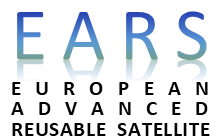Project
Key Strategic Orientations
-
Promoting an open strategic autonomy of Europe by leading the development of enabling and emerging technologies
-
Ensure a clean and healthy environment
-
Making Europe a sustainable economy through the transformation of its construction and production systems
Background
Currently, no reusable satellites are operational in the world. Only spaceplanes and capsules are available for research and commercial activities in space, but they are either very expensive or with very limited flexibility and capabilities covering the high-end sector of market.
In the EARS project, we target the low-cost, microsatellite market, with the development of an affordable, flexible paltform that can be easily produced in large numbers.
Objective
The objective of the EARS project is to design a reusable, low-cost microsatellite and to develop the related critical enabling technologies. The reusable spacecraft is intended to de-orbit in a controlled manoeuvre to deliver its products and results back to Earth after several months in orbit, thereby enabling innovative research that would benefit from the space environment, especially from microgravity conditions.
The ultimate goal of the project, in fact, is to establish a continuous service for space entities and research institutes by launching one reusable satellite per month.
Innovation
The innovation of the EARS project is to combine the best recovery strategies and technologies to make a small satellite reusable – minimizing turnaround, refurbishment, and the impact on in-orbit capabilities.
Main applications
-
In-space manufacturing
-
Commercial or scientific research in microgravity
-
IOD/IOV
-
Missions for space inspection, servicing, and active debris removal
-
Outreach and educational programs for public entities
Impact
While reusability is a trending topic for launchers, it is still a concept way too far to the satellite industry, above all in the small satellites segment.
Although the expected impact is primarily technological and economic (e.g., maturation of key enabling technologies, disruptive concept of reusability applied to small satellites, decreasing costs of flight opportunities), countless indirect impacts are expected on the scientific, technological, and educational fields – also not directly related with space – because of all the research that the EARS buses can enable.
| Project Number: | 101082531 |
|---|---|
| Project name: | European Advanced Reusable Satellite |
| Project acronym: | EARS |
| Call: | HORIZON-CL4-2021-SPACE-01 |
| Topic: | HORIZON-CL4-2021-SPACE-01-23 |
| Type of action: | HORIZON Research and Innovation Actions |
| Project starting date: | 1 January 2023 |
| Project duration: | 24 months |
| Total funding: | 1 296 157.00 Euro |
